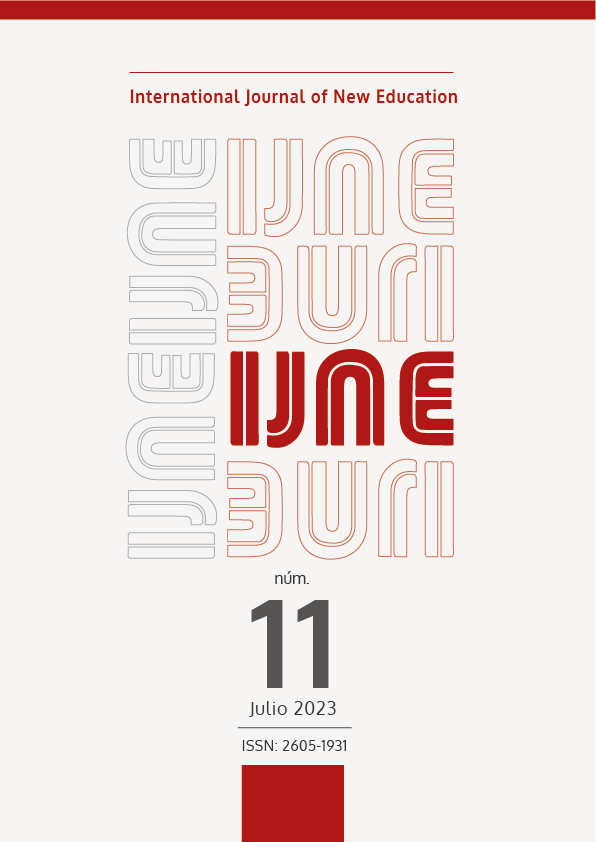Possibilities of Creative Practices to Work with the Intercultural Approach in the Social Work Degree
DOI:
https://doi.org/10.24310/IJNE.11.2023.16975Keywords:
social work, Creative practices, interculturality, inclusion, dialogueAbstract
Working with the intercultural approach in educational centres is a way of promoting diversity as a normality and thus being able to eradicate excluding events from society (Martínez-Salanova, 2006; Aguado, 2017). The role of this approach within the classroom, at any age, is essential to educate without labels and prepare children and adults for current reality. Based on this idea, this research proposes an educational experience which deals with interculturality and creative practices, performed with Social Work university students in the subject “Intervention, diversity and interculturality”. This educational experience begins with an explanation of the meaning of Inclusive education, the intercultural approach, and creative practices. After clarifying these concepts, some examples of creative practices observed by the researchers in the field are suggested as models. Then, some specific questions are proposed for the students to reflect about and encourage a debate on creative practices and interculturality. With this practice, we aim to promote reflection on the meaning and relevance of using creative practices in educational and social contexts and to develop inclusive values in future social workers through the creation of debates and texts in relation to intercultural and creative practices. The value of inclusion is promoted through the participation of all students, dialogue, and reflection on the debate about creative practices that aimed to promote the intercultural approach. However, some of the practices presented are focused on performativity rather than on the humanist approach.
Downloads
Metrics
Publication Facts
Reviewer profiles N/A
Author statements
Indexed in
-
—
- Academic society
- N/A
- Publisher
- Universidad de Málaga
References
Abdallah-Pretceille, M. (2006): El enfoque intercultural: un paradigma para pensar la diversidad. Congreso INTER. www.uned.es/ congreso-inter-educacion-intercultural.
Aguado Odina, T. (2009). “El enfoque intercultural como metáfora de la diversidad en educación”. En Odina, T. A., & Del Olmo, M, Educación intercultural: perspectivas y propuestas, 13-28. Editorial Universitaria Ramón Areces.
Aguado Odina, T. (2011). El enfoque intercultural en la búsqueda de buenas prácticas escolares. Revista Latinoamericana de Inclusión Educativa, 5 (2), p. 129-143.
Aguado Odina, T. (2017). “El Enfoque Intercultural en Educación”. En Aguado Odina, Teresa y Mata Benito, Patricia. (coords.). (2017). Educación Intercultural. Madrid: UNED. ISBN: 978-84-362-7198-0.
Allan, J. (2008). Rethinking Inclusion: The Philosophers of Difference in Practice. Springer.
Beach, D. & Dovemark, M. (2007). Education and the commodity problem: Ethnographic investigations of creativity and performativity in Swedish schools. Tufnell Press.
Bracons, H. (2019). Conhecer para intervir: competência cultural no Serviço Social. Editorial Cáritas.
Bracons, H & Leiva, J. (2019). A relevância da interculturalidade para uma prática mais inclusiva em trabalho social. In A. M. Costa e Silva, I. Macedo; S. Cunha (Eds.), Livro de atas do II Congresso Internacional de Mediação Social: a Europa como espaço de diálogo intercultural e de mediação (pp. 82-91). Braga: CECS.
Craft, A. (2005). Creativity in Schools: tensions and dilemmas. Routledge.
Craft, A. (2014). Wise Humanising Creativity: a goal for inclusive education. Revista de Educación Inclusiva, 7(1), 3-15.
Freire, P. (1970). Pedagogía del Oprimido. Siglo XXI.
Goyette, G. & Lessard, M. (1988). La investigación-acción sus funciones, sus fundamentos y su instrumentación. Laertes.
Jeffrey, B. (2006). Creative teaching and learning: Towards a common discourse and practice. Cambridge Journal of Education, 36(3), 399-414.
Kemmis, S. y McTaggart, T. (1988). Como planificar la investigación acción. Barcelona. Laertes.
Martínez-Salanova, E. (2006). “De la transculturación a la interculturalidad. Cómo presentan los medios la emigración, el mestizaje y las relaciones interétnicas”. Portularia. Revista de Trabajo Social, vol. 5, 2, pp. 45-53. www.uhu.es/cine.educacion/articulos/transculturacion.htm
Olivencia, J. (2015). Las essências de la educación intercultural. Ediciones Aljibe.
Pareja de Vicente, D. & Olivencia, J. (2018). Interculturalidad y cultura de la diversidad en el contexto universitario. Editoral Comares.
Vigo, B. (2021). Desarrollo de Prácticas de Enseñanza Creativa e Inclusiva con Medios Digitales. In C. Latorre and A. Quintas, Inclusión educativa y tecnologías para el aprendizaje (pp. 129-144). Octaedro.
Woods, P. & Jeffrey. B. (1996). Teachable Moments: The art of creative teaching in primary schools. Open University Press.
Downloads
Published
How to Cite
Issue
Section
License
Las obras se publican en edición electrónica bajo una licencia Creative Commons Reconocimiento-NoComercial 4.0 España: se pueden copiar, usar, difundir, transmitir y exponer públicamente, siempre que:
a) Se cite la autoría y la fuente original de su publicación (revista,
editorial y URL de la obra.
b) No se usen para fines comerciales.
c) Se mencione la existencia y especificaciones de esta licencia de uso.
Será responsabilidad exclusiva de los autores obtener los permisos necesarios de las imágenes que estén sujetas a derechos de autor.










16.png)
